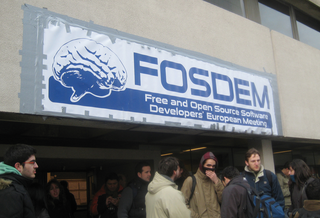
By Nils Magnus, Anika Kehrer
FOSDEM 2009 organizers recently gathered the European open source developer community to Brussels (Figure 1). Information and notebooks were in such demand that at least two participants reported their devices stolen. Kernel developer and current CTO of the Linux Foundation, Ted Ts'o, was one of the unfortunates.
Ts'o was prepared for the mishap, however, and had a backup notebook with which he demonstrated the advantages of, and road map for, the new ext4 filesystem to the more than 5,000 participants. The new filesystem expands the ext2 and ext3 formats and is still able toread them. Copying an ext3 to a newly installed ext4 allows a faster filesystems check, according to Ts'o. New data structures called extends facilitate the speed increase as they address an array of blocks instead of individual accesses.
Most presentations and workshops were organized largely independently by a mere two dozen projects. Nonetheless, organizers covered a large spectrum of topics, albeit with variable content depth.
In a keynote, for example, Mark Surman of the Mozilla Foundation gave a vague account of the effects of the netbook surge and Mozilla's goal to help customers explore the Internet. Bdale Garbee, Chief Debian at HP, might have tabulated the many innate qualities of the distro, but shied away from announcing its next release. Later on, Steve McIntyre not only announced Kurt Roeckx as the new Debian project secretary, but finally revelaed the project's plan to release Lenny on Valentine's day.
With more than a dozen concurrent developer rooms, the event was a success despite the persistence of previous years' worrisome air quality and the fact that real technological advancements were presented in a somewhat subdued context (Figure 2). Mark your calendars for FOSDEM 2010.
| Conf Talk |
|
We talked to the heads of three major Linux distros during the conference. OpenSUSE's Joe Brockmeier, Debian's Steve McIntyre, and Red Hat's Max Spevack explained their agendas for upcoming releases as well as the projects' philosophies. Although the representatives from Debian and Red Hat's Fedora share philosophies, representatives from openSUSE and Fedora see more eye-to-eye on technological terms. The three interviewees discussed what differences they see in their distros, how they can work together, and what their organizations can contribute. See the video interview online [1]. |
| INFO |
|
[1] Anika Kehrer, Nils Magnus: "FOSDEM Video: Micro Distro Summit": http://www.linux-magazine.com/online/news/fosdem_video_micro_distro_summit
|